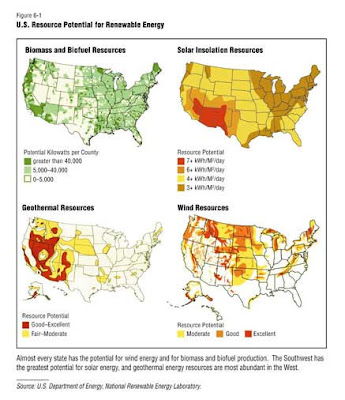NEW ENERGY TO FACE HOUSE VOTE THIS WEEK
Speaker Pelosi appears to have done some bigtime wheeling and dealing to open the way for a vote on the Udall-Platts "Renewables" amendment (also called the Renewable Portfolio Standard or RPS).
Go to POWER OF WIND to see the American Wind Energy Association's new video about the RPS and find out how to support Ms. Pelosi's principled stand for renewable energy.
AWEA points out that over the long haul there would be no significant cost increase for power while a renewables industry would create huge economic benefits: $100 billion in energy savings, 350,000 new jobs, economic windfalls to farmers who install turbines, reduced greenhouse gas emissions and reduced imported oil dependency are all likely in the wake of a national RPS.
Altered bill could please energy-state Democrats
David Ivanovich, July 30, 2007 (Houston Chronicle)
and
Pelosi gains support for energy bill
H. Josef Hebert, July 30, 2007 (AP via Yahoo news)
WHO
House Speaker Nancy Pelosi, D-Calif., Rep. Gene Green, D-Houston, Rep. Charles Gonzalez, D-San Antonio, and 12+ “hydrocarbon Democrats” representing oil- and gas-producing states; Lee Fuller, vp, Independent Petroleum Association of America.
 American resources (click to enlarge)
American resources (click to enlarge)WHAT
Still working to bring an energy bill to the House floor this week, Speaker Pelosi is making hard compromises with energy-state Democrats. It is reported Pelosi WILL allow the Udall-Platts amendment, requiring a portion of national electricity to come from renewables, to be considered in the floor fight. Vehicle fuel standards and oil and gas revenue issues have been part of what it is rumored Pelosi had to give up to get the renewables amendment included.
WHEN
Ms. Peolosi is struggling to get the energy legislation to the floor for a vote this week, probably August 3, just before the summer recess.
WHERE
When the bill’s provisions are worked out by House leadership, it will go to the Rules Committee and then be brought before the full House for debate.
WHY
- The renewables package is known as the Renewable Portfolio Standard (RPS) because it is the specific standard (requirement) for how much of national electricity would come from renewables, among the other energies in the US portfolio. It is sometimes also called the Renewable Electricity Standard (RES).
- More than 20 states already have an RPS, as does the EU.
- If the congress adopts an RPS, it will give renewable energy producers long-term assurance of markets, despite temporary fluctuations, allowing them to build the brand new infrastructure required to move the nation from the fuels of the 20th century to the fuels of the 21st century.
- RPS legislation was blocked in the Senate by conservative southern Republicans influenced by powerful coal-burning utilities.
- The Department of Energy’s Energy Information Agency study said an RPS would not significantly raise power rates and would likely be good for the economy. Wood Mackenzie, a neutral think-tank, said an RPS would not raise power rates and would likely be good for the economy. A Union of Concerned Scientists study said an RPS would not raise power rates and would likely be good for the economy. A utility company think tank said an RPS would raise power rates and would likely be bad for old-fashioned coal-burning utilities.
 click to enlarge. ignore the politics and watch it crumble down.
click to enlarge. ignore the politics and watch it crumble down.- Whether there will be a vote on Corporate Average Fuel Efficiency (CAFÉ) standards is not determined. Senate Democrats compromised many points to pass its tougher CAFÉ standards package over objections of leaders from car-manufacturing states.
- Pelosi held onto the 47 “Blue Dog” Democrats with concessions on how oil and gas producers pay federal royalties and deadlines drilling permits. She also withdrew a proposal giving states authority to block interstate electric power lines. "Royalty-in-Kind" provisions allowing oil and gas companies working offshore in the Gulf of Mexico to pay federal royalties in oil and gas rather than cash are pending.
- Rep. Joe Barton, Texas, ranking Energy and Commerce Committee Republican called Peolosi’s package the "non-energy, energy bill" because it fails to support increased oil and gas production and expansion of nuclear energy. Pelosi says it is a new direction in energy, promotes conservation and incentivizes the development of renewables, plug-in hybrid cars and efficiency.
QUOTES
- Green: "…there's no unanimity among Democrats on anything…"
- Gonzalez: "A lot of credit has to go to the leadership for their willingness to meet with us and move some…"
- Fuller: "If you look at the total package, you're still faced with a substantial set of new burdens — or old ones revived — that reduce the ability to produce ... oil and natural gas on federal lands…"








0 Comments:
Post a Comment
<< Home